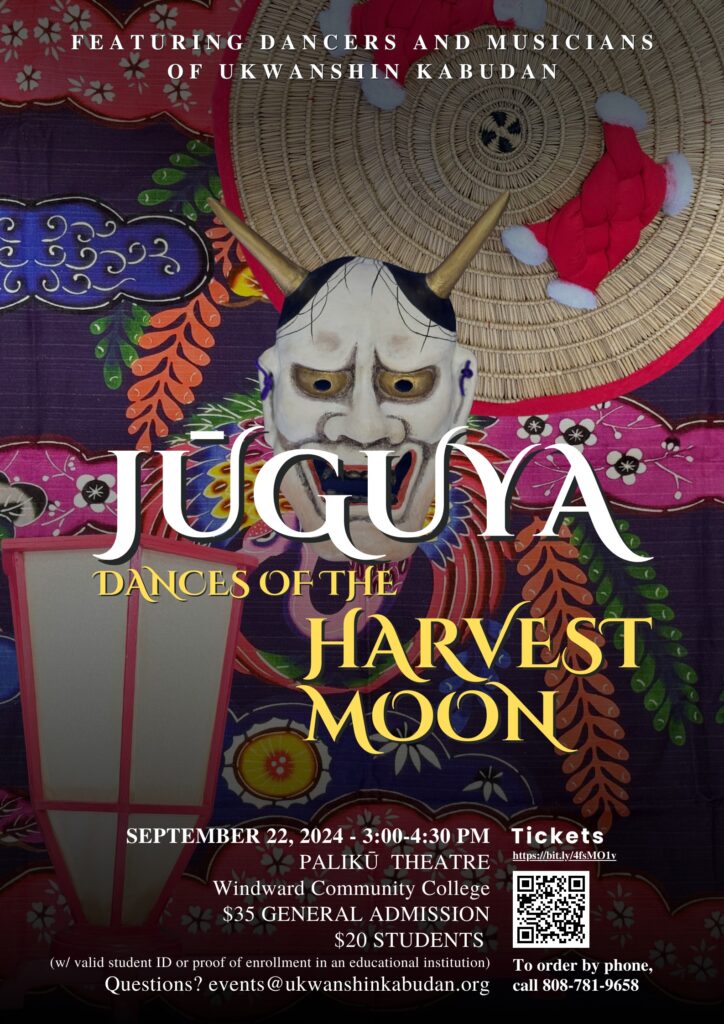
What: “Jūguya; Dances of the Harvest Moon”, Rare performance
celebrating 305 years of Kumi Udui and classical Ryūkyū music and dances
When: Sunday, September 22, 3pm
Where: PALIKŪ THEATER, University of Hawaiʻi, Windward Community College
Jūguya; Dances of the Harvest Moon, celebrates the lunar August full moon, which marks the transition to the Autumn season, as well as prayers, songs and dances to celebrate the harvest and wishes for a good planting for the next year. It also connects to the ancestors in sharing traditional ceremony, protocol, food, music and dances, while acknowledging the role of the islands as our second mother for the elements we receive to sustain our lives. Featured in this special
performance, will be the Kumi Udui Shūshin Kani iri.
Ukwanshin Kabudan is a not for profit, Federally recognized 501c3 organization, which promotes education, revitalization, and re-indiginization of traditional Ryūkyūan arts, language, and history. Ukwanshin works with communities and individuals, educational institutions, and government in Okinawa and in the overseas
communities to help reconnect and strengthen Indigenous identity, culture, language, and history through the performing arts, workshops both online and in
person, heritage journeys, and mentoring students from Okinawa and in the
overseas community. ukwanshin.org / https://living.halekulani.com/hawaii-okinawan-community/
Kumi Udui was first created in 1718, incorporating influences from Chinese opera, Noh, Kabuki and Kyūgen. It was first performed in 1719. This special and rare performance for the August Moon, will feature the Kumi Udui Shūshi Kani iri, which is one of the two initial pieces premiered in 1719. The performance will be done in the Shuri dialect of the Okinawan language, with translation through projected subtitles. This is a rare chance to experience and enjoy music and dances
that were originally reserved for the court.
Historical Information:
During the Ryūkyū Kingdom, 1429-1879, the people of Ryūkyū navigated the seas to establish trade and political relations with multiple countries in Southeast Asia, the Philippines, Korea, China, and Japan. The relationships built with these countries, and some Pacific Islands, helped gain the respect and recognition of Ryūkyū as the “Land of Propriety”.
China respected and recognized Ryūkyū through a tributary relationship, and sent investiture envoys with court robes and a crown from the emperor, to recognize the ascension of a new king of Ryūkyū. As hosts of honorable guests, the Ryūkyū court prepared lodging, food, and entertainment during the visit, which sometimes lasted a few months due to the tides and wind conditions for the return to China.
In 1609, the Satsuma clan of Japan successfully invaded the Ryūkyū Kingdom and took control of trade and commerce, while leaving the kingdom intact so they could gain the profits of overseas trade with China and other countries Ryūkyū connected with. During the time of Satsuma dominion, Ryūkyū was forced to make tribute visits to the Shogunate in Edo, so that Satsuma could boast its power over a foreign, “uncivilized” country. However, to show their abilities in literature
and the fine arts, the Ryūkyū envoys took advantage of the humiliating visits and educated themselves in the history, politics and arts of the Japanese, which impressed the Tokugawa and raised their status and recognition to one of great respect.
In 1718, Uēkata, Chōkun Tamagusuku was assigned as udui bugyō (magistrate of dance), and used his knowledge of the Chinese performing arts and Japanese performing arts of noh, kabuki and kyōgen to create a uniquely Okinawan form of musical drama known as kumi udui. In 1719, during the chrysanthemum viewing day, on Gungwachi kukunuchi, the ninth day of the ninth month of the lunar calendar, kumi udui was presented for the first time, to entertain the Chinese investiture envoys. Two choreographies were presented. Nīdu Tichiuchi, and Shūshin Kani iri, which was received with great appraisal.
A collaborative performance between Okinawa Kumi Udui artists and
Ukwanshin Kabudan was scheduled for April of 2020 at PALIKŪ to celebrate
the 300th anniversary of Kumi Udui. However, due to COVID, this significant
performance was canceled. This event will celebrate the 305 years of Kumi
Udui, with appreciation for the assistance from Okinawa. This also introduces
the inclusion of Okinawan Dance and Theater Arts into Windward Community
Collegeʻs Hawaii Conservatory of Performing Arts.
